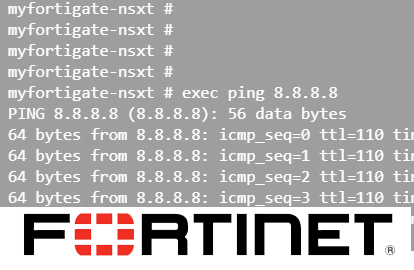Sistemə daxil olma
ssh admin@192.168.0.10 <- Fortigate Default user is admin
Avadanlıq haqqında bilgi alma komandaları
Ayarlara baxmaq üçün komandalar
# show
# show |grep xxxx
# show full-configuration
#show full-configuration | grep XXXX
#show full-configuration | grep -f XXXX ← display with tree view
Şəbəkə məlumatlarına baxmaq üçün komandalar
Yönləndirmə(routing)
# get router info routing-table detail
# show router static
# config router static
(static) # show
(static) # endCheck Firewall Policy
# show firewall policy
# show firewall policy XXXX
# config firewall policy
(policy) # showCihazın vəziyyəti haqqında
| Cihaz haqqında məlumat | # get hardware status |
| BIOS və Firmware versiyasına baxmaq | # get system status |
| Məkəzi prosessorun və əməli yaddaşın vəziyyəti | # get system performance status |
| NTP server | # get system ntp |
| Cari vaxtı və NTP serveri ilə sinxronizasiya vaxtını göstər | # execute time |
| İnterfeyslərin vəziyyəti haqqında və hansının hazırda UP yaxud Down olduğunu göstərir | # get system interface physical |
| İnterfeysləri yoxlamaq | # config system interface (interface) # show (interface) # end |
| ARP cədvəlini görüntüləyir | # get system arp |
Obyekt əməliyyatları
# config firewall address
(address) # show <-- check all address configuration
(address) # end# config firewall address
(address) # edit "test1"
(address) # show <- check
(address) # abort <- End and discard last config# config firewall address
(address) # edit "test1"
(address) # show <- check
(address) # set subnet 192.168.0.5 255.255.255.0
(address) # show <- check
(address) # end <- End and save last config.config firewall address
edit "test-server-10"
set associated-interface "vlan10"
set subnet 192.168.0.5 255.255.255.0
endPolicy əməliyyatları
#config firewall policy
(policy)# show <- show all policy
(policy)# end
##config firewall policy
(policy)# edit 555
(policy)# show
(policy)# abort <- End and discard last config
#config firewall policy
edit 555
set name "test"
set srcintf "vlan10"
set dstintf "port 5"
set srcadr "xxxx" "xxxx" "xxx"
set action accept
set schedule "always"
set servie "HTTP" "ICMP_ANY"
end <- End and save last config.Silmək(pozmaq) komandaları
Policy silmək üçün
# config firwall policy
# delete 1
# endRouteri silmək üçün
# config router static
# delete 1
# endFortigate İcra əmrləri
| Kömək | # ? |
| ping | # execute ping 192.168.0.1 |
| traceroute | # execute traceroute 192.168.1.1 |
| telnet | # execute telnet 192.168.0.10 # execute telnet 192.168.0.1 22 |
| ssh | # execute ssh user@192.168.0.10 # execute ssh user@192.168.0.10 23 |
| execute command like tcpdump | # diagnose sniffer packet port15 ← Interface Port15 # diagnose sniffer packet any ‘host xx.xx.xx.xx’ # diagnose sniffer packet port15 ‘host xx.xx.xx.xx’ # diagnose sniffer packet any ‘host xx.xx.xx.xx or host yy.yy.yy.yy’ # diagnose sniffer packet any ‘udp port 53 or tcp port 53’ # diagnose sniffer packet any ‘host xx.xx.xx.xx and tcp port 80’ |
| Söndürmək | # execute shutdown |
| clear arp table | # execute clear system arp table |
Yedəkləmə(backup) ayarı
# exec backup config tftp conf/test-fw-01_20180913.conf 192.168.0.10
CLI vasitəsilə log-lara baxma
Log filterinə baxış
# execute log filter dump
category: traffic
deice: memory
(snipp)
Filter:
(snipp)Filter təyin etmə
# execute log filter device <- Check Option
Example output (can be different if disk logging is available):
Available devices:
0: memory
1: disk
2: fortianalyzer
3: forticloud
# execute log filter device XX <- Set Option# execute log filter category <- Check Option
0: traffic
1: event
2: utm-virus
3: utm-webfilter
4: utm-ips
5: utm-emailfilter
7: utm-anomaly
8: utm-voip
9: utm-dlp
10: utm-app-ctrl
12: utm-waf
15: utm-dns
16: utm-ssh
17: utm-ssl
18: utm-cifs
19: utm-file-filter
# execute log filter category XXXX <- Set OptionÖrnək olaraq aşağıdakına diqqət edin:
# execute log filter device 1 <- 1: disk
# execute log filter category 1 <- 1: event
# execute log display






